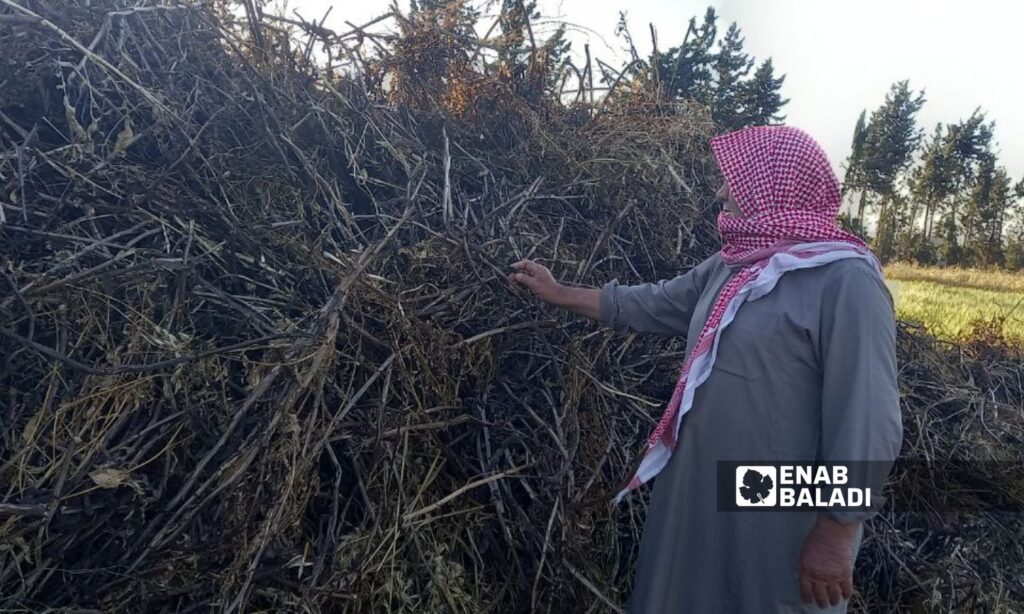Daraa – Halim Muhammad
With the beginning of the broad bean harvest season, prices have dropped in the local market of Daraa, southern Syria, where the price per kilogram has reached 4,000 Syrian pounds, while it was not less than 10,000 Syrian pounds last April.
Farmers believe that the current price does not leave them any financial profit that matches the amount of labor, effort, and costs, as they were unable to sell it green before it dried because the price was also low, reaching 2,000 pounds last March.
The area of land planted with broad beans in Daraa for this season is 3,024 hectares, concentrated in the western countryside of Daraa with fields in Tafas, Jalin, Tal Shihab, Da’el, and Nawa, and these areas supply the al-Hal markets in Daraa and Damascus.
Price does not match costs
Saad al-Din Kiwan, a farmer from the city of Tafas in the western countryside of Daraa, told Enab Baladi that he planted broad beans on an area of 10 dunams this year and could not get a suitable price for selling in the green broad bean season, and the same applies to the dried ones as it seems.
He added that the current price of the seed (dry beans) does not cover production costs, as the wage for laborers to cut the crop reached 150,000 Syrian pounds per dunam, and 100,000 pounds for gathering it into piles locally known as “al-Tghameer”.
The fee for the machine (thresher) that crushes the plant and sorts out the seeds and straw separately is 200,000 Syrian pounds per dunam.
The farmer estimated that his production per dunam was about 150 kilograms of seeds, noting that he sold a ton of broad beans when they were green.
He mentioned that the costs are not limited to the harvesting season; they also include medicine costs, amounting to five million Syrian pounds, which he owes to the agricultural pharmacy in the area.
The wages for plowing the land have risen to 100,000 Syrian pounds per dunam, as have the wages for laborers, who earn 6000 pounds per hour of work.
In the broad bean planting season in November, the price of a kilo of seeds reached 10,000 Syrian pounds, and each dunam requires 15 kilos.
For storage or grazing
Zuhair al-Muhammad (33 years old), a farmer, was pushed by the drop in broad bean prices to store the production of his land, totaling 1.1 tons in his warehouse in al-Muzayrib town in the western countryside of Daraa, hoping that the price will improve with the start of preparations for the next season in October.
He said that the current glut makes merchants only pay between 4,000 and 5,000 Syrian pounds, but after a while, the material in the market decreases as feed mills consume quantities of it, and in the planting season, the demand for seeds increases.
Meanwhile, Farmer Hussein (25 years old) in Tal Shihab town, sold his crop covering 15 dunams as a grazing field for livestock at a price of 100,000 Syrian pounds per dunam, as he could not afford the harvesting cost.
Hussein told Enab Baladi that he financially lost this season, as the value of selling his crop for grazing only equaled the plowing cost.
Broad beans, rich in protein, are considered a major ingredient in animal feed mixtures and the drop in their price has prompted livestock breeders to buy quantities of it, and farmers also sell the broad bean straw (crushed stems and leaves of the plant).

